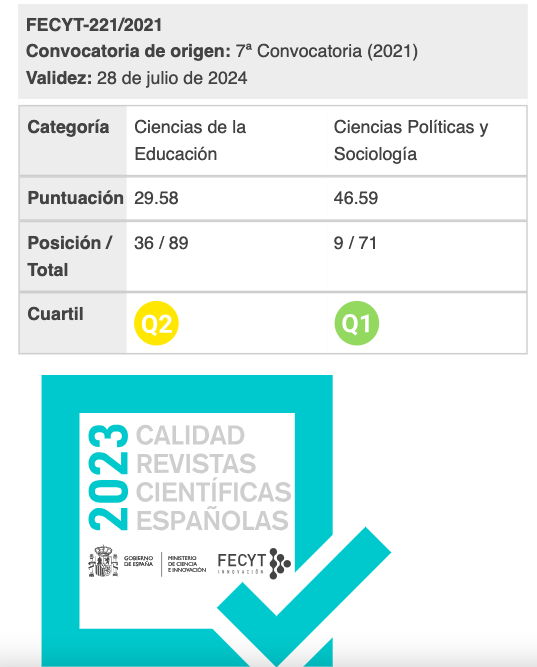Participación Política, Medios de Comunicación y Redes Sociales en los Adolescentes Catalanes
Downloads
Abstract
El grado de implicación política de los adolescentes es una cuestión abierta que atraviesa el debate académico generación tras generación. Actualmente, esta cuestión se ve salpicada por la irrupción de las redes sociales y los nuevos medios. El presente artículo estudia la vinculación entre el uso de medios, redes sociales y el interés por la política de una amplia muestra de estudiantes catalanes del último curso de Educación Secundaria Obligatoria. La investigación concluye que las dinámicas de participación política y las plataformas de debate de los adolescentes no difieren en exceso de las generaciones mayores y que, por tanto, las redes sociales no parecen haber afectado al grado de implicación política de los adolescentes.
Downloads
References
Anduiza, E., Cantijoch, M. y Gallego, A. (2009). Political participation and the Internet. Information, Communication and Society.12(6):860 – 878
Google Scholar Crossref(http://dx.doi.org/10.1080/13691180802282720)
Google Scholar CrossrefAnduiza, E., Cristancho, C., & Cantijoch, M. (2012). La exposición a información política a través de internet. Arbor, 188(756), 673-688. (http://dx.doi.org/10.3989/arbor.2012.756n4004)
Google Scholar CrossrefBallano, S., Uribe, A.C. & Munté-Ramos, R-A. (2014). Young users and the digital divide: readers, participants or creators on Internet? Communication & Society, 27(4), 147-155.
Google Scholar CrossrefBoemer, M. L. (1987). Correlating lead‐in show ratings with local television news ratings. Journal of Broadcasting & Electronic Media, 31(1), 89-94. (http://dx.doi.org/10.1080/08838158709386647)
Google Scholar CrossrefBoyd, M. J., Zaff, J. F., Phelps, E., Weiner, M. B. y Lerner, R. M. (2011). The relationship between adolescents' news media use and civic engagement: The indirect effect of interpersonal communication with parents. Journal of Adolescence 34.
Google Scholar Crossref(http://dx.doi.org/10.1016/j.adolescence.2011.07.004)
Google Scholar CrossrefBrundidge, J., Rice, R. E. (2009). Political engagement online: Do the information rich get richer and the like-minded more similar. In A. Chadwick (Ed.), Routledge handbook of Internet politics (pp.144-156). London, New York: Routledge.
Google Scholar CrossrefChadwick, A. (2012). Recent shifts in the relationship between the Internet and democratic engagement in Britain and the United States: granularity, informational exuberance and political learning. In Anduiza, E., Jensen, M. & Jorba, L. (Eds.), Digital media and political engagement worldwide: a comparative study (pp.39-52). Cambridge: Cambridge University Press.
Google Scholar Crossrefde la Fuente, J. R. (2010). Ciberpolítica, redes sociales y nuevas movilizaciones en España: el impacto digital en los procesos de deliberación y participación ciudadana. Mediaciones sociales, (7), 143-164.
Google Scholar CrossrefDe Zúñiga, H. G., Puig-i-Abril, E., & Rojas, H. (2009). Weblogs, traditional sources online and political participation: An assessment of how the Internet is changing the political environment. New media & society, 11(4), 553-574. (https://doi.org/10.1177/1461444809102960)
Google Scholar CrossrefDelli Carpini, M. X., Cook, F. L., & Jacobs, L. R. (2004). Public deliberation, discursive participation, and citizen engagement: A review of the empirical literature. Annual Review of Political Science, 7, 315–344.
Google Scholar Crossref(http://dx.doi.org/10.1146/annurev.polisci.7.121003.091630)
Google Scholar CrossrefFarrell, H. (2012). The consequences of the Internet for politics. Political Science, 15(1), 35-52. (http://dx.doi.org/10.1146/annurev-polisci-030810-110815)
Google Scholar CrossrefFishkin, J. S., & Luskin, R. C. (1999). Bringing deliberation to the democratic dialogue. In M. McCombs & A. Reynolds (Eds.), The poll with a human face: The National Issues Convention experiment in political communication (pp. 3–38). Mahwah, NJ: Erlbaum.
Google Scholar CrossrefGaines, B. J., Mondak, J. J. (2009). Typing together? Clustering of ideological types in online social networks. Journal of Information Technology & Politics, 6(3-4), 216-231.
Google Scholar Crossref(http://dx.doi.org/10.1080/19331680903031531)
Google Scholar CrossrefHenn, M., Weinstein, M., & Wring, D. (2002). A generation apart? Youth and political participation in Britain. The British Journal of Politics and International Relations, 4(2), 167-192. (http://dx.doi.org/10.1111/1467-856X.t01-1-00001)
Google Scholar CrossrefHooge, M and Wilkenfeld, B (2008) The Stability of Political Attitudes and Behaviors across Adolescence and Early Adulthood: A Comparison of Survey Data on Adolescents and Young Adults in Eight Countries. Journal of Youth and Adolescence. 37(2): 155-167 (http://dx.doi.org/10.1007/s10964-007-9199-x)
Google Scholar CrossrefHuckfeldt, R., & Sprague, J. (1995). Citizens, politics, and social communication: Information and influence in an election campaign. Cambridge, England: Cambridge University Press.
Google Scholar CrossrefGastil, J., & Dillard, J. P. (1999). Increasing political sophistication through public deliberation. Political Communication, 16, 3–23.
Google Scholar CrossrefMitchell, A., Gottfried, J. and Matsa K.E. (2015) Milennians and Polítical News, Pew Research Center Analysis. Available in: http://www.journalism.org/2015/06/01 /millennials-political-news/
Google Scholar CrossrefMoy, P., Gastil, J. (2006) Political Communication Predicting Deliberative Conversation: The Impact of Discussion Networks, Media Use, and Political Cognitions. Political Communication, 23:443-460,
Google Scholar CrossrefMuñoz, J., & Tormos, R. (2012). Identitat o càlculs instrumentals? Anàlisi dels factors explicatius del suport a la independència. Barcelona: Centre d’Estudis d’Opinió.
Google Scholar CrossrefMutz, D. C., & Martin, P. S. (2001). Facilitating communication across lines of political difference: The role of mass media. American Political Science Review, 95, 97–114.
Google Scholar CrossrefPrice, V., Cappella, J., & Nir, L. (2002). Does disagreement contribute to more deliberative opinion? Political Communication, 19, 95–112.
Google Scholar Crossref(http://dx.doi.org/10.1080/105846002317246506)
Google Scholar CrossrefPutnam, R. D. (2000). Bowling alone: The collapse and revival of American community. New York: Touchstone.
Google Scholar CrossrefSturgis, P., Roberts, C., & Allum, N. (2005). A different take on the deliberative poll: Information, deliberation, and attitude constraint. Public Opinion Quarterly, 69, 30–65 (http://dx.doi.org/10.1093/poq/nfi005)
Google Scholar CrossrefTorney-Purta, J (2002) The School's Role in Developing Civic Engagement: A Study of Adolescents in Twenty-Eight Countries. Applied Developmental Science, 6(4): 203-212 (http://dx.doi.org/10.1207/S1532480XADS0604_7)
Google Scholar CrossrefWojcieszak, M. E., Mutz, D. C. (2009). Online groups and political discourse: do online discussion spaces facilitate exposure to political disagreement? Journal of Communication, 59(1), 40-56. (http://dx.doi.org/10.1111/j.1460-2466.2008.01403.x)
Google Scholar CrossrefYoo, S.W. & Gil de Zúñiga, H. (2014). Connecting blog, Twitter and Facebook use with gaps in knowledge and participation. Communication & Society 27(4), 33-48
Google Scholar CrossrefDownloads
Published
Almetric
Dimensions
How to Cite
Issue
Section
License
All articles are published under Creative Commons copyright (CC BY). Authors hold the copyright and retain publishing rights without restrictions, but authors allow anyone to download, reuse, reprint, modify, distribute, and/or copy articles as the original source is cited.















